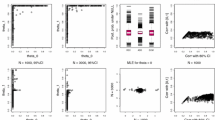Abstract
In gene-disease association studies, deviation from Hardy–Weinberg equilibrium in controls may cause bias in estimating the allele-based estimates of genetic effects. An approach to adjust the variance of allele-based odds ratio for Hardy–Weinberg equilibrium deviation is proposed. Such adjustments have been introduced for estimating relative risks of genotype contrasts and differences in allele frequency; however, an adjustment of odds ratios for allele frequencies still does not exist. The approach was based on the delta method in combination with the Woolf’s logit interval method and the disequilibrium coefficient. The proposed variance adjustment provided better power than the unadjusted one to detect significant estimates of odds ratio and it improved the variance estimation.


Similar content being viewed by others
References
Zintzaras E, Koufakis T, Ziakas PD, Rodopoulou P, Giannouli S, Voulgarelis M. A meta-analysis of genotypes and haplotypes of methylenetetrahydrofolate reductase gene polymorphisms in acute lymphoblastic leukemia. Eur J Epidemiol. 2006;21:501–10.
Weir BS. Genetic data analysis II: methods for discrete population genetic data. Sunderland, MA: Sinauer Associates; 1996.
Schaid DJ, Jacobsen SJ. Biased tests of association: comparisons of allele frequencies when departing from Hardy–Weinberg proportions. Am J Epidemiol. 1999;149:706–11.
Zou GY, Donner A. The merits of testing Hardy–Weinberg equilibrium in the analysis of unmatched case–control data: a cautionary note. Ann Hum Genet. 2006;70:923–33.
Zintzaras E, Lau J. Synthesis of genetic association studies for pertinent gene-disease associations requires appropriate methodological and statistical approaches. J Clin Epidemiol. 2008. doi:10.1016/j.jclinepi.2007.12.011.
Sasieni PD. From genotypes to genes: doubling the sample size. Biometrics. 1997;53:1253–61.
Lathrop GM. Estimating genotype relative risks. Tissue Antigens. 1983;22:160–6.
Agresti A. On logit confidence intervals for the odds ratio with small samples. Biometrics. 1999;55:597–602.
Silcocks P. An easy approach to the Robins–Breslow–Greenland variance estimator. Epidemiol Perspect Innov. 2005;2:1–6.
Woolf B. On estimating the relation between blood group and disease. Ann Hum Genet. 1955;19:251–3.
Zintzaras E. Association of methylenetetrahydrofolate reductase (MTHFR) polymorphisms with genetic susceptibility to gastric cancer: a meta-analysis. J Hum Genet. 2006;51:618–24.
Armitage P. Tests for linear trends in proportions and frequencies. Biometrics. 1955;11:375–86.
Sato Y, Suganami H, Hamada C, Yoshimura I, Sakamoto H, Yoshida T, Yoshimura K. The confidence interval of allelic odds ratios under the Hardy–Weinberg disequilibrium. J Hum Genet. 2006;51:772–80.
Author information
Authors and Affiliations
Corresponding author
Rights and permissions
About this article
Cite this article
Zintzaras, E. Variance estimation of allele-based odds ratio in the absence of Hardy–Weinberg equilibrium. Eur J Epidemiol 23, 323–326 (2008). https://doi.org/10.1007/s10654-008-9242-6
Received:
Accepted:
Published:
Issue Date:
DOI: https://doi.org/10.1007/s10654-008-9242-6




